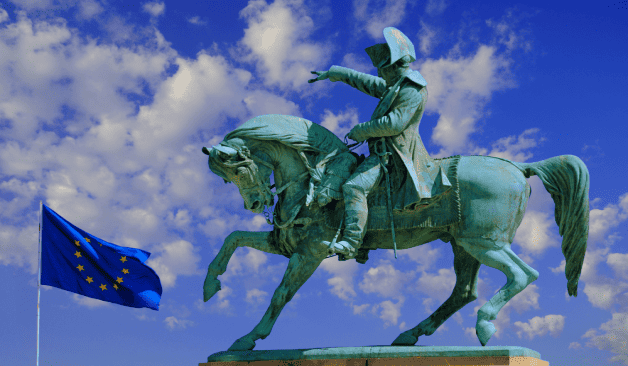
Napoleon and his impact on the European economy
We have a new movie release this week - Napoleon. But why are we discussing a movie and Napoleon Bonaparte in a financial blog? Napoleon is not only associated with war and his relentless journey to power, but he also has a key role to play in the development of the European economy.
As per historians, Napoleon had a crucial role to play in developing the European economy during his rule from 1799 to 1814. His policies and military campaigns brought about both positive and negative effects on the economic landscape of the continent. In this article, we will look at both sides of the coin and the views can be divided – a hero, villain or somewhere in between?
How Napoleon impacted the European economy?
Let us start with the positive impacts that the European economy had during Napoleon’s rule:
The Napoleon Code
Even before an economy can be standardized, it is essential to standardize the legal system. Napoleon did so through his Napoleonic Code. It is a comprehensive legal system that standardized laws across the territories under his control. It was a groundbreaking legal system introduced in 1804 that significantly impacted not only France but also various territories under Napoleon's control. The code served as a comprehensive and systematic compilation of laws, aiming to provide a clear and consistent legal framework for the diverse regions that fell under Napoleon's rule.
Introduction of Banking System
Napoleon also played a pivotal role in reshaping the financial landscape of Europe by introducing significant banking reforms. One of the key measures was the establishment of the Banque de France in 1800, which served as the central bank of France. Yes, it was Napoleon who established it.
The Banque de France played a crucial role in stabilizing the French economy by issuing a unified national currency, managing government finances, and providing a reliable foundation for economic transactions.
Before Napoleon, France had a fragmented and unreliable banking system. With Napoleon's introduction of the Banque de France, it changed the financial landscape of France. The centralized nature of the bank contributed to greater financial stability, as it could regulate the money supply and coordinate monetary policy. The move not only facilitated trade and investment but also provided the French government with a more efficient means of financing its military campaigns.
Furthermore, the Banque de France became a model for other European nations as Napoleon expanded his influence. The concept of a central bank gained traction, and similar institutions were established in various countries under French control. While the Napoleonic era's banking reforms were not without challenges and controversies, they laid the groundwork for the development of modern banking systems in Europe, influencing the financial structures of many nations for years to come.
Infrastructure Development
Napoleon invested in extensive infrastructure projects, such as the construction of roads, bridges, and canals. These improvements aimed to enhance transportation and communication networks, facilitating the movement of goods and people.
Modern transportation networks are essential for economic development, and the infrastructure improvements initiated by Napoleon contributed to the foundation of efficient transportation systems that are still in use today.
Encouragement of Industry
Napoleon's policies to encourage industrialization and reduce dependence on foreign goods had a lasting impact on the economic structures of the regions under his control. While the specific industries may have evolved, the general principle of promoting domestic industries for economic self-sufficiency is a concept that continues to influence economic policies.
The Dark Side: Negative Impact on European Economy
If you were to associate one word with Napoleon? What would it be? Most would say - war. Napoleon's times were all about war and border expansion. His military campaigns were extensive and costly. The Napoleonic Wars, which lasted from 1803 to 1815, involved almost every major European power, and it took a heavy toll on the economy. The constant warfare imposed a heavy financial burden on France and its allies. We are sure you would be able to relate to it now that we have seen two wars in recent times - how the economy is strained with the expenses of maintaining large armies, funding military campaigns, and the associated destruction of infrastructure.
Perhaps, the biggest setback came from the Continental System. It was implemented by Napoleon in an attempt to isolate Britain economically and weaken its economy. This ban forbade European nations under French control from trading with Britain. However, this policy had negative repercussions on the economies of the countries within the system. It led to shortages of goods, and economic hardships for merchants and manufacturers, and stimulated smuggling as a form of resistance. The after-effects of which are seen even today.
No point in guessing, Napoleon's fiscal policies were created to keep wars in the fund - He would have policies with heavy taxation and reliance on war financing. It contributed to inflation. The over-issuance of assignats (paper currency) and the manipulation of financial instruments to fund military endeavors led to economic instability and the depreciation of currency values.
Before you go
Napoleon's policies and military campaigns brought about both positive and negative effects on the economic landscape of the continent. Napoleon's impact on the European economy was multifaceted. While some of his policies promoted economic stability and modernization, the overall effect was often overshadowed by the economic drain of prolonged warfare and the disruptive consequences of his military and political ambitions.










